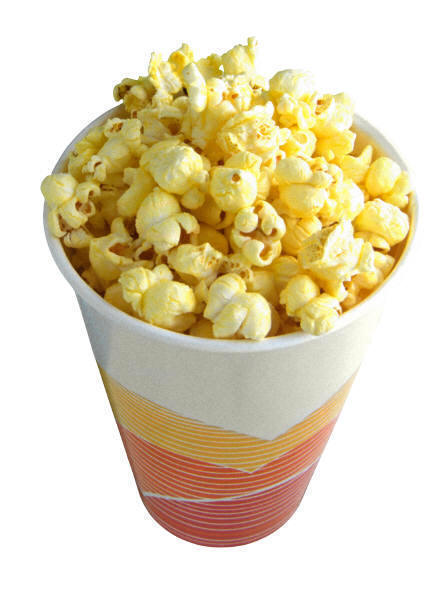
Russell Crowe, re-imagined as Cary Grant
A GOOD YEAR

Russell Crowe, re-imagined as Cary
Grant
PopcornReel.com Movie Review: "A Good Year"
By Omar P.L. Moore/November 10, 2006
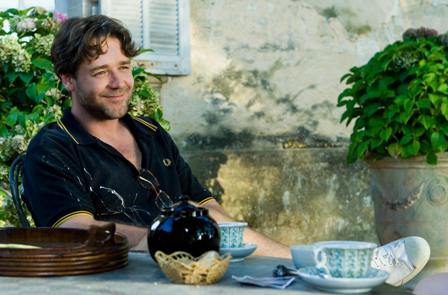
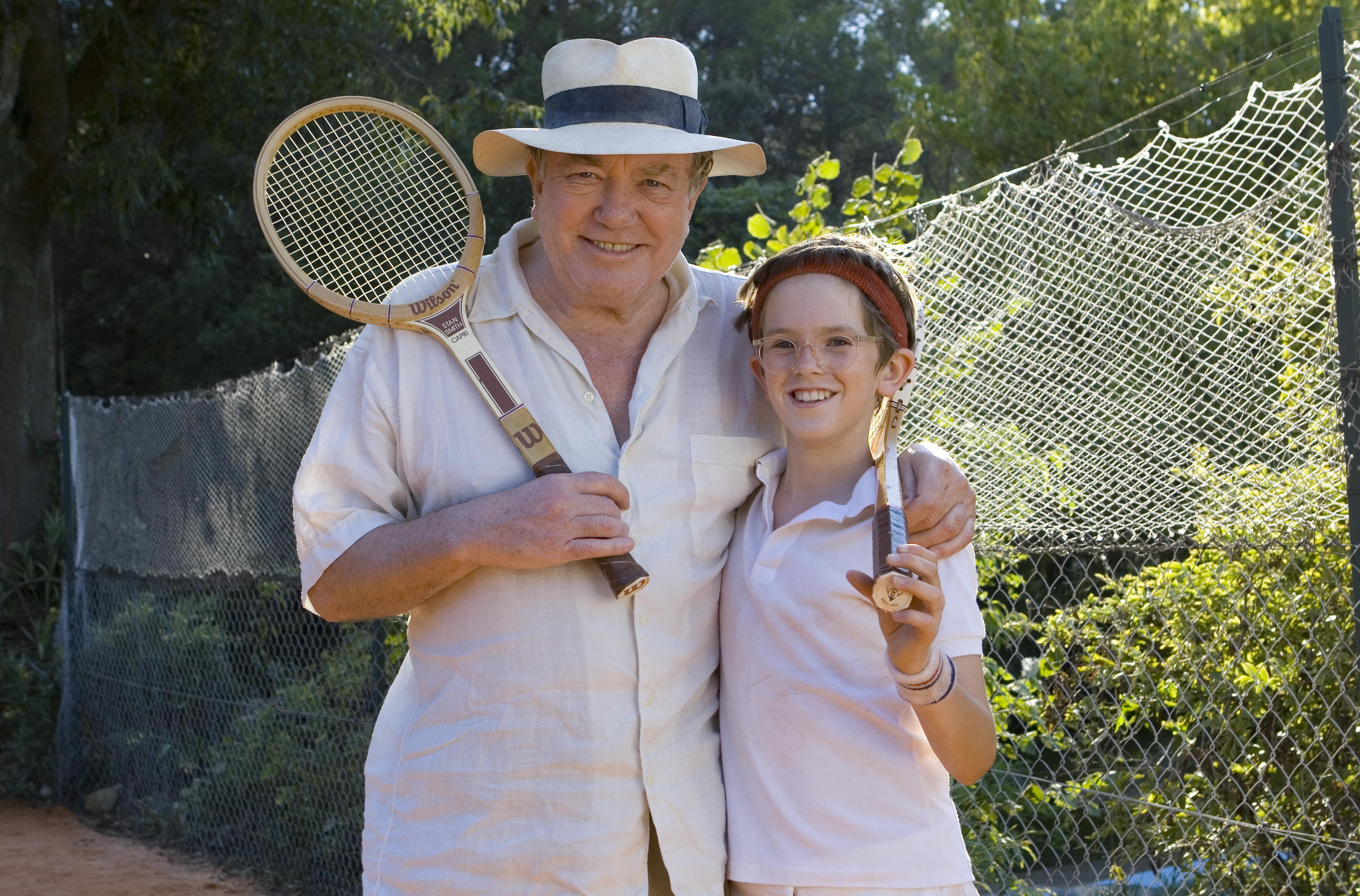
Reminiscing: Russell Crowe plays Max, a
Cary Grant-esque lovable rogue with charm and panache; Albert Finney is great as Max's
uncle Henry, pictured with Freddie Highmore, who plays young Max, in Ridley
Scott's funny, witty and charmingly entertaining "A Good Year". (All
photos: Rico Torres/20th Century Fox)
Whatever some people may say about Russell Crowe, one thing that
cannot be denied is that he is one of the greatest actors of his generation.
He is compelling, intense, and precise. He has a litany of work that would
make any actor proud. In Ridley Scott he has a director who is excellent
at image makeovers -- and for almost two hours Scott softens the image of Mr.
Crowe, both as a rugged actor and as complex off-screen personality in the
nostalgic "A Good Year", which firmly revises Crowe into Cary Grant.
"A Good Year" is a jaunty comedy that has a 1960's-feel to it
and that is not by accident -- it seems that the title itself -- principally
referring to wine and its age, also refers to a time of playful innocence and
fun -- much like some of Grant's films, such as Charade in which he starred with
Audrey Hepburn. Crowe has a lovable roguish flair and appeal about him here as Max, a
ruthless, aggressive stockbroker boss from England who sends the markets in
London up and down on a furious trading spree, frustrating his rivals. He
is reviled and despised (euphemistically, of course!) by everyone (except his
lawyer) we find out early on in this humorous film, and he is soon summoned to the
French countryside with news that his estranged and yet beloved Uncle Henry (wonderfully played by
the great Albert Finney) has passed and left his prized vineyard estate to Max, whose
intention (in the tradition of his stockbroker occupation) is to sell it.
Max's assistant Gemma (Archie Panjabi), a very attractive woman, shepherds him
through the French countryside from London via her Treo 600 device (an ever
present commodity in "A Good Year") and essentially saves Max from himself, as
he gets into one clumsy mishap after another.
Besides being lost in France, Max is a charming playboy whose ladies' man
qualities are showcased in abundance, although some of the women he encounters
give him a run for his money -- two of them do, in fact. One is Christie (Australian
actor Abbie Cornish) who claims to be the daughter -- illegitimate or otherwise
-- of Henry, thereby claiming that she has a rightful entitlement to the wine
estate that Max wants to sell. Their interplay is fraught with both a
mistrust and a sexual tension that percolates but remains unexploded and
carefully guarded. The other woman is Fanny Chenal (Marion Cotillard) who
entrances Max. Fanny has reasons to be mad at Max, and has a reason to
call him Mad Max. She shows him (and half of the restaurant that she is a
waitress for) the reason, and it sets off the small quiet community buzzing. Max
has to struggle with several decisions about his life -- and both women as well
as his dear departed uncle and the vineyard estate, are indispensable keys to the
decision making process. "A Good Year"
uses the confluence of these dilemmas against the dueling expanse of the French
countryside, and the frenetic breakneck confines of a dreary London business
world.
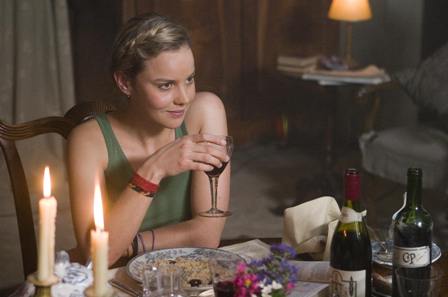
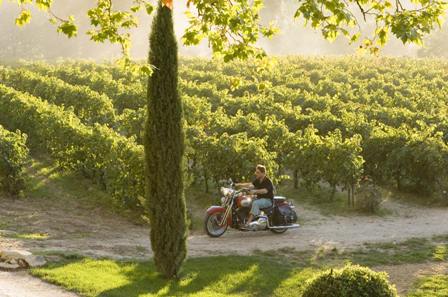
Eyes on the prize(s)?: Abbie Cornish as
Christie, has her eye on the vineyard estate which Max (Russell Crowe)
motorbikes through, (right). Does she have her eye on Max too?
There are some predictable moments in "A Good Year" and although the film seems
to be ordinary for the first half hour, it gathers pace under Mr. Scott's
ironically languid direction and obvious admiration for the romantic allures of France.
If the film feels very French, it's not just because it is set there, but
because the director himself happens to live in the French countryside -- so for
Mr. Scott, the British-born filmmaker, coming home never felt so good, and in "A
Good Year" it shows -- and the audience can feel it. The nostalgia of
"A Good Year" leaves us with reasons to smile, as do the performances in
particular by Mr. Crowe, Ms. Cotillard, Mr. Finney, Ms. Panjabi and Tom
Hollander (who plays Max's lawyer Charlie.) Also of note are the great
performances by Didier Bourdon and Isabelle Candelier (who play the Duflots, a
married French couple who were young Max's vineyard garden tender and housekeeper
respectively). Abbie Cornish is also a revelation as the woman who may or
may not be related to Max and Henry. Freddie Highmore (of "Finding
Neverland") does well as young Max.
There is a nostalgia (and hunger) for this kind of film today -- and the
closing credits are very much in the tradition of a playful 1960's film,
something that the British-born Cary Grant would have starred in, as would
Audrey Hepburn. It seems that "A Good Year", which is a great viewing
experience is as much about Ridley Scott's fond remembrances of innocent,
playful times as it is about the story itself, which is based on the book by
Peter Mayle. Marc Klein's adaptation for the screen crackles to life and
the music is priceless. The soundtrack will surely be one that pleases the
ear. One thing that the ladies of the movie audience might not be so
pleased with is the little of Mr. Crowe that they are able to see without
clothing on. For most of the men however, reward is granted, courtesy of
numerous shots of semi-nude or scantily-clad women sunbathing, dancing
seductively, showing cleavage or getting into all manner of predicaments.
This is not a criticism of Mr. Scott -- it is not even a comment so much on
sexism in film, as it is a harkening back to an era and a place in film,
specifically European film, where an openness and carefree attitude about sex, suggestion
and expression reigns very much supreme, even today.
That said, Mr. Crowe, a native New Zealander (many believe albeit in error, that
he is originally from Australia) is at his best here when he trades delightful
barbs with his acting cohorts, as well as uttering quiet little witty comments
to himself. Indeed, it is in the quiet moments where "A Good Year" excels
mightily, much more so than in its large ones. Crowe's character's English
accent, dialect and witticisms are a delight, as is the other British vernacular
in "A Good Year". The French-accented banter is also a treat, as are some
choice words about Lance Armstrong's seven consecutive Tour De France victories,
about which Max never fails to remind some of the cycling locals he encounters
on his travels.
One final note: the cinematography by Philippe Le Sourd is beautiful, but when you have such
picturesque visions anything your camera captures will make you an even better
photographer than you already are. The glory of "A Good Year" is that it
is a greatly enjoyable, colorful and lightly farcical viewing experience.
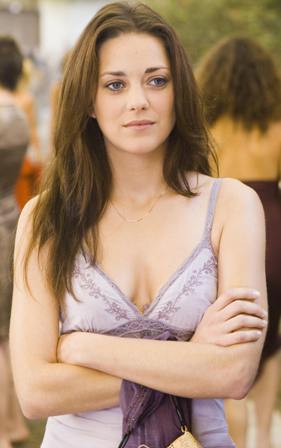
Marion Cotillard as Fanny Chenal in "A Good
Year".
Copyright 2006. PopcornReel.com. All Rights
Reserved.
"A Good Year" is rated PG-13 by the Motion Picture Association of America
for language and some sexual content.
The film's duration is one hour and 58 minutes, and worth almost every single
priceless one.